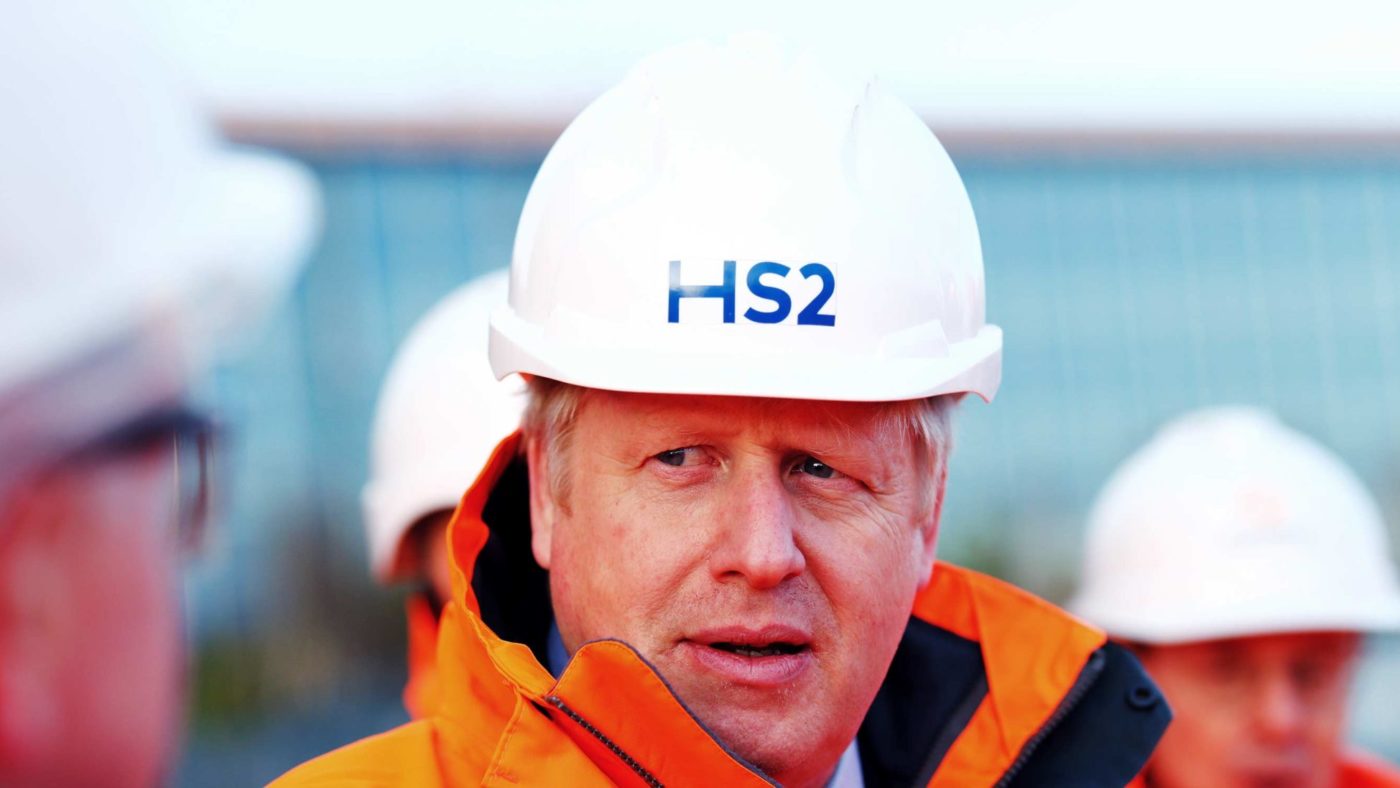Boris Johnson has a reputation as a politician with an enthusiasm and flair for grands projets. He’s the dreamer behind the Garden Bridge and ‘Boris Island’, by far the boldest mooted solution to London’s airport capacity problem. Now he’s going to “level up” the UK with major infrastructure projects, possibly including a bridge to Northern Ireland.
On the face of it, his decision to give the final green light to HS2 fits this image. But it really reveals it as something of a mirage.
Despite winning the largest Conservative majority since the mid-80s, to date the Government has exhibited little of the clear-eyed certainty of that era. Instead, the months since the election have been marked by a sense of unsteadiness. Given that a Prime Minister is seldom more powerful than immediately after taking office, this ought to trouble the Conservatives.
It isn’t difficult to see why he made the decision he did. The sunk costs fallacy is a very powerful one. It is one thing to make a show of re-assessing your predecessor’s priorities – as Theresa May did over Chinese involvement in Hinkley Point – but quite another to actually terminate a big project. Another factor may have been a wariness of the “HS2-Industrial Complex” turning on Andy Street’s re-election campaign in the West Midlands.
But more than that, Johnson is a politician who really understands the power of symbols. And that’s what HS2 – whose real dividends will not start being paid until Johnson has left office, if ever – really is to him. A symbol of this Government’s commitment to “levelling up” the rest of the country.
The Prime Minister has form on this front. The bridge to Northern Ireland – which will almost certainly never get built – serves as an eye-catching statement of his commitment to a Union he unabashedly shafted to “get Brexit done”. His enthusiasm for outlandish river crossings in London overshadowed the fact that he actually cancelled more than he built.
‘Boris Island’ must be the apex of this particular art, as it allowed him to look like a go-getting enthusiast for air travel whilst opposing every practical means of increasing London’s airport capacity. But a symbol is all it was. As Prime Minister he continues to pour cold water on Heathrow, yet who truly believes Johnson is about to green light an estuary airport? If you do, he has a bridge to Ulster to sell you.
Of course, HS2 will get built. Or at least part of it will be. The symbolic element here is not the London to Birmingham section, really, but the promise of future extensions to Manchester, Leeds, and Scotland (and presumably Belfast, if you’re a believer). Whatever his faults, Johnson understands the power of these visions.
Yesterday’s decision moves us beyond the debate – well-explored elsewhere on this site – about whether or not HS2 is a good idea, and on to the thornier question of what the fallout might be and what it tells us about this Government. It’s a disquieting prospect.
In the immediate term, it will not be surprising is the Government manages to bring down HS2’s costs from their more eye-popping heights. Nigel Harris of RAIL magazine, has set out in some detail how ministers could do this. The means are quite technical and in many instances are de facto downgrades, but it is no less plausible to spin this as effective ministerial intervention than capitulating on the backstop as “unlocking” the Brexit negotiations.
But the bigger picture is of a Government which seems to be burning through a lot of political capital to little obvious benefit. Beyond HS2, the Prime Minister is antagonising huge chunks of the Tory tribe with big talk on everything from ill-conceived constitutional reform to vast tax increases. Even his outriders can’t roll the pitch for his programme, because the evidence suggests that he has not yet decided what it is.
The implications of this could be enormous, because it strikes at the heart of one of Johnson’s real powers: his ability to charm not his opponents, but his supporters. He couldn’t get a better deal out of Brussels, but he could sell the Conservative Party on a deal they had crucified May over. The Prime Minister is a very, very skilled political illusionist.
In theory, this makes him the man for the moment. Holding on to the Tories’ new coalition will involve selling its traditional backbone on a range of policies they won’t be well-disposed towards. Tackling the housing and social care crises will involve controversial measures. At the start it was quite possible to imagine Johnson soft-selling his MPs and activists on a gradual shift towards a new model of Toryism.
It is harder to see now. His early decisions have got the Right’s guard up, and this will have consequences for his freedom of manoeuvre over the next five years. The upshot is that the PM may find it much harder to sell a well-spun concession to Brussels in December than he did in January.
Without a vision around which to unite both his party and his electoral coalition, each could fracture beneath him. And nobody who cheered his deal, having previously fought May to a standstill over the prospect of an internal border in the United Kingdom, will have any right to complain.
Click here to subscribe to our daily briefing – the best pieces from CapX and across the web.
CapX depends on the generosity of its readers. If you value what we do, please consider making a donation.


